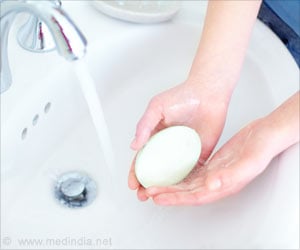A new way to counter the dreaded MRSA seems to have been found - stitches and dressings laced with bacteria-killing viruses.
A new way to counter the dreaded MRSA seems to have been found - stitches and dressings laced with bacteria-killing viruses.
Called methicillin-resistant staphylococcus aureus, or MRSA, these germs can cause skin infections that in rare cases have led to pneumonia, bloodstream infections and a painful, flesh-destroying condition.Actually, about 25% of people normally carry staph in the nose, mouth, genitals, and anal area. The foot is very prone to pick up bacteria from the floor. The infection often begins with a little cut, which gets infected with bacteria.
These staph infections range from a simple boil to antibiotic-resistant infections to flesh-eating infections. The difference between all these is how deep and how fast the infection spreads, and how treatable it is with antibiotics.
MRSA is hard to treat because the bacteria have developed resistance to the penicillin drug family.
Now Glasgow experts in the UK offer a way out. Strathclyde University researchers have bonded infection-fighting agents to materials such as nylon.
Sutures, the thread used to stitch up patients during operations, could host the viruses - reducing the chance of patients developing an infection.
In tests, the agents killed 96% of MRSA strains from people in three hospitals.
Dr Janice Spencer, from the University of Strathclyde, said: "Some bacteria-specific viruses - called bacteriophages - have been used in the past to help clear up infections caused by bacteria.
"However, their use died out when antibiotics like penicillin and methicillin became widely available.
"We are looking at them again now that multiple antibiotic resistant strains of bacteria have become such a problem in hospitals."
The research team has also developed a device that allows rapid detection of MRSA on contaminated surfaces.
They claimed hospital staff would be able to use it to screen patients before surgery to limit the chances of them passing on an infection, BBC reports.
"Simple and effective rapid detection of bacteria is important to limit the chance of infection occurring in the first place," Dr Spencer said.
"Patients who are carriers for MRSA can be isolated and decontaminated by using standard methods or by using immobilised bacteriophages incorporated into creams or body washes."
She will present the research at the Society for General Microbiology's meeting at Edinburgh International Conference Centre later.
A year-long pilot screening programme for the MRSA in hospitals was announced by Health Secretary Nicola Sturgeon last week.
Source-Medindia
GPL/B





